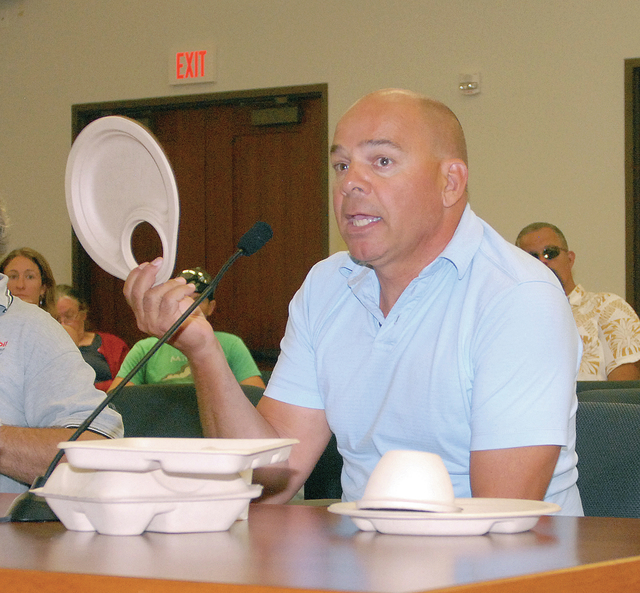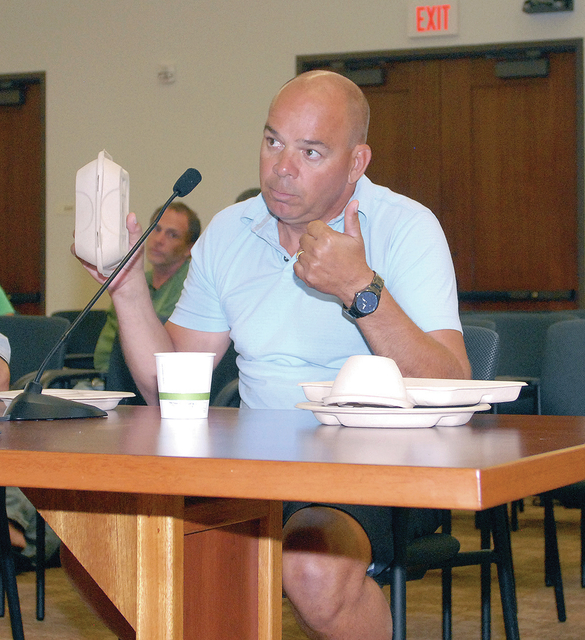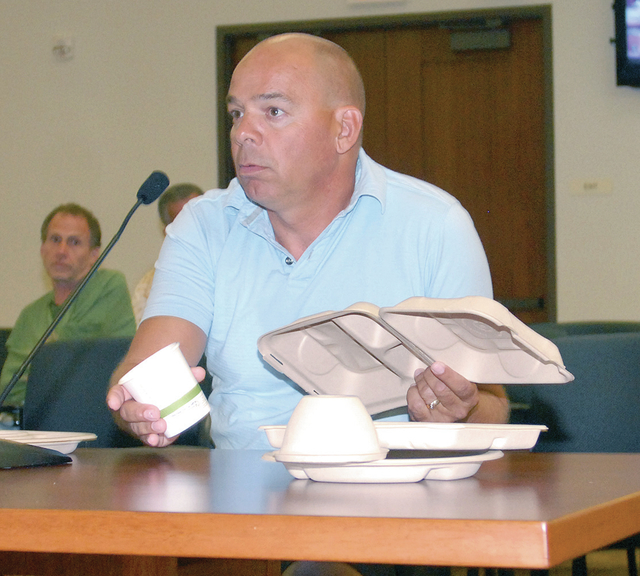HILO — Foam food containers were back on the table Tuesday, when the County Council Environmental Management Committee on a 5-3 vote advanced a bill restricting those made of polystyrene. ADVERTISING HILO — Foam food containers were back on the
HILO — Foam food containers were back on the table Tuesday, when the County Council Environmental Management Committee on a 5-3 vote advanced a bill restricting those made of polystyrene.
The bill next goes to the full council.
Bill 13 would prohibit food being dispensed in disposable polystyrene — popularly known as “Styrofoam” — containers beginning July 1, 2018. It would exempt ice chests and coolers, county facility users and food vendors with county approval and providers of supplies during county emergencies declared by the mayor.
A similar bill was killed by the previous council on a 4-4 deadlock. Three of the council members on the yes side last year voted yes, as did new council members Eileen O’Hara, the bill sponsor, and Jen Ruggles, both representing Puna.
“This is what malama aina looks like,” said Ruggles, referring to the “caring for the land” slogan often voiced by environmentalists and Native Hawaiians.
Hilo Councilman Aaron Chung, who had voted against the bill last year, was absent for Tuesday’s vote.
Hilo Councilwoman Sue Lee Loy questioned exemptions in the bill and asked about other polystyrene packing, such as packaging in grocery stores.
Kohala Councilman Tim Richardson also had concerns. He was particularly concerned about local beef in groceries and whether a packaging bill could put local farmers at a disadvantage.
Richards wanted to slow the process down to get his concerns addressed.
“My concern is putting a Band-Aid on a Band-Aid on a Band-Aid and not fixing the problems,” Richards said. “I know where this is going but I want it to be great when it gets there.”
A disagreement over procedure threatened to slow the bill’s progress. Kona Councilman Dru Kanuha said the county code requires the bill go to the Environmental Management Commission first. Kanuha had missed the council vote last year, but had opposed the bill in committee.
“I’m still concerned about the proper protocol and moving this bill forward,” Kanuha said. “This is not whether I agree or disagree with the bill, or the contents within.”
But proponents pushed the bill forward.
“I think we’ve waited much too long,” said Council Chairwoman Valerie Poindexter, who voted in favor of the bill last year. “Move it to council and enough of the delays already.”
“I think as a native of this island, we have to start somewhere,” said South Kona/Ka‘u Councilwoman Maile David, also a yes vote last year.
More than 35 people testified, with the vast majority supporting the ban. Supporters ran the gamut from high school students to business owners who sell food in compostable products to a distributor of alternative containers made from wheat straw.
One opponent, representing an Oahu foam food container manufacturer, K. Yamada Distributors, said switching from polystyrene is no longer necessary because Mayor Harry Kim last week canceled a contract that would have created a compost facility to process the biodegradable containers.
A waste-to-energy anaerobic digestion facility planned for Waikoloa will be able to convert energy from the foam containers, said Yamada representative Joy Gold.
The foam containers “will be valued as feedstock,” Gold said.
A group of Kohala High eleventh-graders presented findings from their class project on plastic pollution; other supporters wore moss green T-shirts bearing the slogan, “Hold the foam.”
“My customers are happy and willing to pay a small bit more to know they are committing to a sustainable solution,” said Kohala Coffee Mill owner Karen Rosen, who switched from foam almost a decade ago. “The cost is not prohibitive.”
State Sen. Russell Ruderman, a Puna Democrat, agreed with Rosen’s assessment. In written testimony, he emphasized he was speaking as a business owner, not a legislator. Ruderman owns the Island Naturals grocery chain which he says stopped using polystyrene containers more than 15 years ago.
“As with plastic bags, unfortunately it falls to the counties to take the lead,” Ruderman said. “Today we have a virtual statewide ban on single use plastic bags, due to the courage and vision of the Hawaii County Council.”
Cory Harden said there are more than 135 Hawaii Island businesses already serving food in other kinds of containers.
“We can have our plate lunch and eat it too — without polystyrene,” Harden said.





